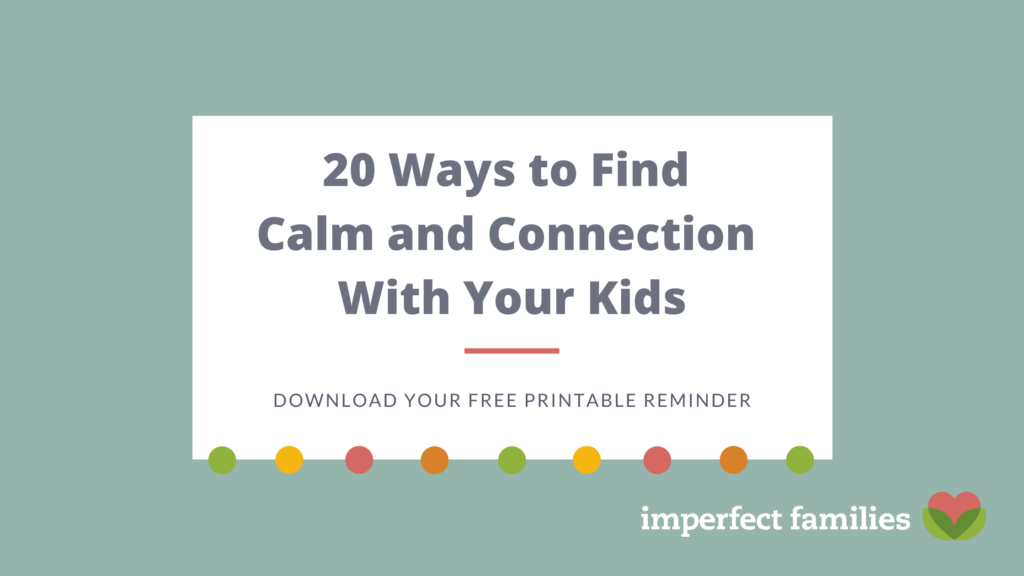Things are out of control. I can’t let them get away with this! How do I make sure my kids know their behavior is wrong? These tips will help you teach your child a lesson in a respectful and productive way – and at a time when they are willing and open to listening!

The screeching is piercing your ears. Like alarm bells in your head. Your body is flooded with panic and you will do practically anything to make it stop.
Old parenting wisdom encouraged parents to intervene immediately, “Don’t let them get away with this!”
But recent brain research shows that kids can’t learn when they are at the height of a meltdown.
That means it’s no use giving a lecture, doling out consequences, or making threats when your child is angry, anxious, pouting, aggressive, or crying.
In those tense moments, our job is to stay calm and present. To support our kids as they relax and return to a calm state of mind.
It will happen. (Eventually.)
Unfortunately, once they’ve reached a calm state, some kids run off and play, oblivious to the meltdown that happened 5 minutes earlier. Others avoid you for the rest of the day, ashamed of their behavior or fearful of the consequences.
You want them to learn a better way to handle the situation next time. You want to teach them a lesson. And you want to do it without yelling or giving a harsh punishment.
What are your options?
When to teach your child a lesson.
Before we go any further, “teaching a lesson” does not mean:
- How can I convince my kids to do things my way?
- How do I convince my kids that I am right?
- How can I force them to apologize?
- How can I force them to admit that they were wrong?
Instead, the goal is to engage in an age-appropriate conversation with our kids. Connecting with them, staying calm, modeling good problem-solving skills, and creating a plan to meet needs or teach skills that might be lacking.
Here are your options:
Talk about it right away. If it’s a small rift or a simple disagreement, you might be able to discuss it a few minutes after it happens.
Talk about it later that day. Continue to let the dust settle and come back to it later when people have had some time away from the triggering event.
Talk about it a few days later. This is a good option for big hot-button topics or for discussing patterns or repeated challenges.
Talk about it randomly. Some things are internalized better when they are peppered throughout other conversations, rather than lumping all of the teaching into a one-time event. Use TV shows, books, or something in everyday life as a springboard for ongoing discussion.
Related: Don’t waste another consequence. Discipline tips what work!
How to teach your child a lesson.
Ok, now that you’ve explored the most appropriate time to talk about the event. Let’s talk about the conversation itself.
Remember:
- It’s not time to give a lengthy lecture.
- It’s not time to repeat your point 20 (or more) times in a row.
- It’s not time to reiterate why you are right and why they are wrong.
- It’s not time to take away all privileges or impose strict consequences.
To have a successful conversation, try these tips:
Not every event needs a “discussion.” Some scenarios need a simple reminder or a quick check-in. “It’s really helpful when everyone hangs their coat in the closet. Thanks!”
Focus on listening. When we’re defensive, it’s easy to point out your child’s every flaw and mistake. Instead, be open to hearing their side of the story or exploring the feelings and thoughts that led to the event.
Don’t jump too quickly to the solution. Remember, this isn’t about forcing your child to see things your way, it’s about working together and creating a better plan for next time.
When in doubt, use empathy. As you sort through what happened, shift your thinking so you can see it through your child’s eyes. You don’t have to agree to guess what they were feeling.
Use “I statements.” Stay focused on your own feelings (“I felt…”) rather than accusing or blaming. (“I felt hurt when you said you hated your lunch because I worked hard to make it. I’m open to hearing more about the things you like or don’t like in your lunch.”)
Brainstorm together. Most of us have a solution already prepared when we sit our kids down for a “talk.” Your child may have a lot of great ideas too! Give them space to comment, offer a solution, or problem solve.
Teach lacking skills. This is the last part. Don’t be tempted to skip here without focusing on connection and empathy first. Your kids will feel more open and willing to hear your point of view if they know you are coming from a place of love and concern – rather than a “because I said so” attitude.
Know your child:
Of course, every child is different. Some children will need more time to settle down after a big feeling. Some children avoid discussions due to shame or embarrassment. Some kids simply move on without giving behavior a second thought.
Learning what works for your child will help your conversations move along more smoothly:
- Does your child do better with side-by-side conversations? Like driving in the car or taking a walk?
- Does your child do better with physical touch during the conversation? Like being cuddled, having their back rubbed or holding their hand?
- Does your child do better with written vs. verbal instructions? Would drawing a picture or a comic strip or writing your thoughts in a letter make it easier for your child to communicate?
- Is your child 3 or 13? It’s tempting to use the same conversation for both ages, but tailoring your words and explanations to their developmental age is essential.
Meltdowns and disagreements are part of life. Rather than closing your eyes and hoping that things will just magically get better, take a deep breath.
Teaching does not need to be aggressive or scary. It doesn’t require yelling or harshness.
Parent with a brain-research-backed solution: wait until everyone is calm!
This might be different than you experienced growing up, so give yourself permission to make mistakes and try again. Be patient with yourself, with your kids, and with this process. If you need more support, Online Parent Coaching provides personalized support as you work to make these changes. Schedule an appointment today!



Comments have been turned off to retain the privacy of all families. If you have a question or comment on the topic, you're always welcome to contact me.